One of the most remarkable things about Breaking Bad, and a defining trait placing it at the highest heights of the TV drama pantheon, was the way it improved from season to season. I’m not sure any show managed the season to season uptick in quality Vince Gilligan managed with his magnum opus. When Better Call Saul showed the same stunning improvement from season 1 to season 2, I dared to hope it could perform the same feat.
With “Lantern,” Gilligan and co-showrunner Peter Gould capped a season 3 that not only jumped in quality yet again, but matched just about any season of Breaking Bad. I never thought I’d say that, but Better Call Saul’s third season was THAT good.
Spoilers for 3×10 “Lantern” below
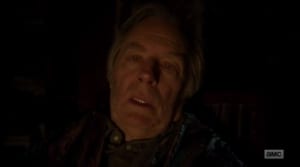
Episode Review
After last week’s episode showed many of these characters at their worst, “Lantern” focused instead on regret and guilt. The feeling splashes on screen from the very first scene (showing a teenaged Chuck reading a story to a very young Jimmy) and never relents. Kim shows deep remorse over working herself to exhaustion, culminating in her car accident. The accident leads Jimmy to beat himself up over Chuck and Irene. Howard Hamlin regrets the breakdown of his professional and personal relationship with Chuck.
Each of them tried to make things right in their own way. Kim gave up Gatwood as a client. Howard uses his own money to pay Chuck’s contract off. Most of all, though, Jimmy tries to make right by both Chuck and Irene for the things he did this season. For all his selfishness, Jimmy has a decent moral core that drives him to hate himself for the self-destructive actions he takes. It was no surprise to find him in a regretful state of mind after his disgustingly selfish actions last week.
Looking back, you can always find a willingness to repent for the people he harms, especially when he cares about them. He always tries to make up with Chuck after the various peaks of their feud, and did so again here. He knew he was wrong for what he did at Davis & Main and tried futilely to extinguish the burning bridges he created. In this episode he even wants to make up with Erin as best he can.
It was no surprise he would try to repair the damage done to Irene’s personal life. Chuck may think Jimmy’s consistent regret to be at least partially faked, but the lengths he went to in order to help Irene showed more than that. He also showed the self-destructive streak which places him in these morally dubious situations to begin with. Jimmy could have repaired Irene’s friendships in many other ways. He could have sat them down in a room together and quietly admitted to his actions, for example.
Instead he chose the flashiest, most harmful way of making things right, a way destroying his relationship with entire communities and the future of his law career. And as usual, this act of self-destruction came in the aftermath of another aftermath with his brother.
Assuming this was the last we’ve seen of Chuck, this was an incredibly powerful and tragic way for him to go.
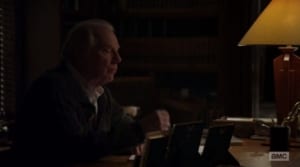
Just like his brother, Chuck spent “Lantern” wallowing in guilt and regret. And just like Jimmy, guilt and regret led him to self-destruction. Chuck’s sole motivation to overcome his illness has always been the law. It was no surprise to see him toss all his progress aside once Howard called his bluff and bought him out of his contract. He tossed aside everything in response; his doctor, his brother, his health, and eventually, his life.
Chuck’s deterioration throughout “Lantern”, and really all of season 3, was highly reminiscent of Edgar Allen Poe’s “The Tell-Tale Heart”. The scene of him tearing apart the house trying to find the remaining electricity in the house was so intentionally reminiscent of that story’s main character panicking over his victim’s beating heart that I can’t imagine the reference to be unintentional. His insistence of sanity in the face of mental illness feels the same as that story’s character. The episode ends with the steady thumping of Chuck’s foot against the table to knock the lantern to the floor.
The man who sets his house ablaze is a man who has lost everything. His wife left him years ago, and we saw him sabotage reconciliation this season. He lost his ability to function in the world with the manifestation of his illness. He lost his brother after recording his confession. Chuck used the law to try and move on but even the law was taken from him. Nothing remained for him.
And so he took his own life.
Everyone else had someone or something to turn to in their guilt and regret. Kim and Jimmy have each other. Howard has his firm. Only Chuck had no one and nothing. For so long the Better Call Saul fandom has proudly shouted “Fuck Chuck” every time he moved against Jimmy. Much like we now regret Jimmy’s disappearance into Saul Goodman, I imagine most of us regret what became of Chuck. I know I do.
I wanted Chuck to get better after the Bar hearing. He tried, and I happily cheered for him. There is no joy or triumph in watching a man lose everything he cares about to the point he wants to take his own life. Season 3 did this at every turn. There was no triumph in Jimmy’s victory at the Bar hearing. There was no joy in Howard pushing Chuck away.
“Lantern” was a fantastic, powerful episode. It was also a tragic one in just about every respect.
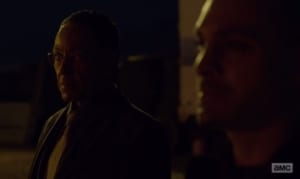
Season Review
Better Call Saul’s entire third season was a fantastic, powerful, and tragic ride rivaling and arguably surpassing any drama currently airing. This half-year has been an incredible one for lovers of prestige dramas (and one I’ve been proud to cover for you here at The Fandomentals). Starting with Black Sails’s wonderful and surprisingly satisfying final season, it has been one incredible show after another. Black Sails, Legion, The Americans, American Gods, The Leftovers, The Handmaid’s Tale, House of Cards, The Expanse, and Fargo all aired near or at the same time as each other.
The only one of those shows matching Better Call Saul’s third season was the amazing third and final season of The Leftovers. Nothing else lived up to the standard of the intelligent writing, outstanding visuals, and a basically perfectly characterized cast. This was not just the best season yet of this surprisingly terrific show, it was as good as anything Gilligan and Gould ever managed with Breaking Bad besides that show’s final season. Even then the only thing holding Better Call Saul back is the inescapable fact that this is not its final season, so it could not match the resolution five seasons of Breaking Bad built up to.
Much like its finale, the entirety of season 3 was a tragic one. For all the dissent about the slow pace of the first two seasons, it did one very important thing very well (among many others); it made you like Jimmy McGill. Between the wonderful writing and Bob Odenkirk’s acting, Saul Goodman was revealed to have once been a kind, charismatic, loyal man with a crooked streak but good intentions. The initial impatience for Saul to show up gradually transformed to regret of the person he inevitably becomes.
When season 3 finally began stripping Jimmy’s good qualities away, there were certainly cheers, but they came with regret. The point of no return has been reached. Jimmy has reached Saul-hood and will never fully recover. I’m sure he’ll still have episodes like this where his good side shines through. Overall, though? We’ve entered a very dark place for Jimmy McGill.
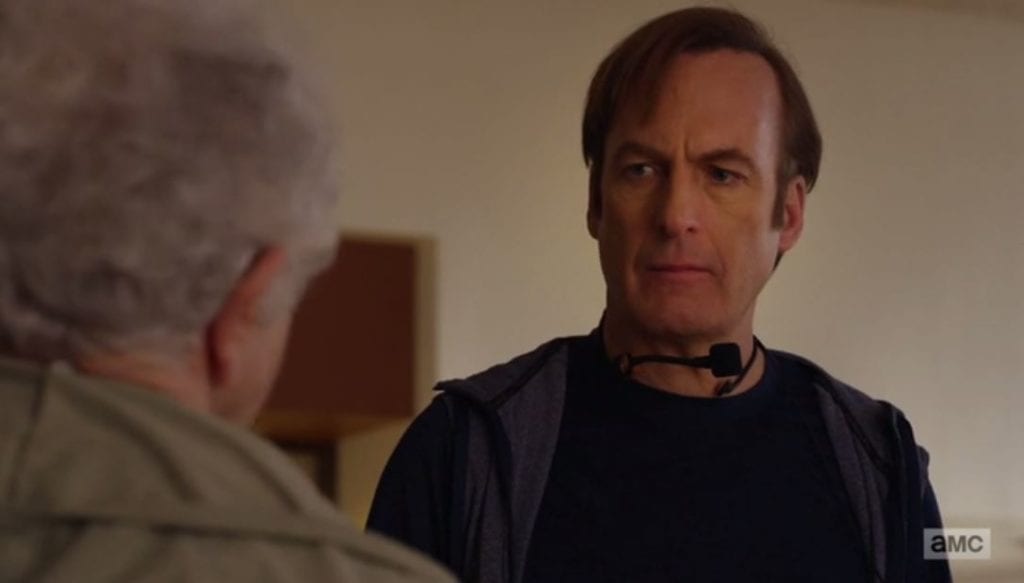
He’s not alone, either. Kim’s accident has led to the loss of their office. Howard’s draining his bank account to pay off Chuck and HHM will almost certainly suffer as a result. Mike went from refusing the drug trade to tying his immediate (and eventual long-term) future to Gus Fring. Nacho put Hector in a hospital and will now have to cover it up.
I expect Chuck will be the first of many tragedies throughout the remainder of this show. We know where most of these characters end up in a few years, and while they may be financially well off, morally they hit the deepest of low points. I’ve always wondered the desire among some fans to see these characters reach these lows, especially when the better versions of them are so compelling. I don’t want to see their better sides disappear, and I dread what exactly Jimmy does to push Kim away.
Now it is possible characters like Kim and Howard find something better and happier away from Saul Goodman rather than tragedy. And I know Better Call Saul will keep them compelling even at their lowest. This show is too good and too well-written, and the actors too good, for them to become completely unlikable. The ultimate tragedy of the show involves the tragedy of good people turning bad, though, and specifically Jimmy McGill and Mike Ehrmantraut becoming the men who Walter White meets.
Unlike Walt, who was an egotistical and awful man in many respects well before cooking meth, Jimmy and Mike were good men. Not perfect or morally upstanding, but they wanted to do right by those they love. They start off Better Call Saul in a good place, trying to live the right way.
For two seasons the show presented them in ways we could easily root for. Even when they didn’t do the best of things. Mike may take jobs as a thug in the drug trade, but he didn’t kill and only took vendetta against a truly awful man in Hector Salamanca. Jimmy may have taken unethical shortcuts, but he took those shortcuts in the name of some moral right, whether he meant to help Chuck, Kim, or a client. At various times you could even forget the men they eventually become.
Season 3 has brought them both to the crossroads leading them to Walter White. There’s no turning back from here. In this sense season 3 was a season built on resolution. Better Call Saul needed closure on the people Jimmy and Mike once were before making them the people they eventually become. This season delivered beautifully on that resolution, to the point I worry how the show will move forward. How will this show look without Chuck McGill? How will it look with a Jimmy McGill whose moral bankruptcy increasingly matches his ethical bankruptcy? Can I still root for Mike as he begins murdering in service of Gus Fring? Will the legal side of the show suffer as it turns increasingly criminal?
And really, I shouldn’t be wondering about any of this. Vince Gilligan and Peter Gould have proven time and time again that they know what they’re doing. With both Breaking Bad and Better Call Saul, they have shown clear improvement with each new season. Now that Jimmy needs new clients, it makes sense we see the transition to a criminal clientele. Gus seems at least suspicious of Nacho’s role in what happened to Hector, if not outright aware what he did.
The foundation has been set for Jimmy and Mike’s stories to finally merge. As amazing as season 3 was, this dichotomy remains the show’s biggest flaw. So often Better Call Saul feels like two different shows. The legal side and the drug side have nothing to do with each other. Now this will almost certainly change.
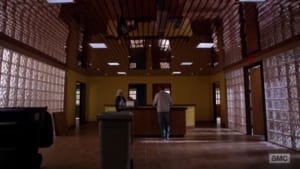
I can’t wait. With season 3 Better Call Saul firmly entrenched itself at or near the top of the TV landscape. It proved itself more than just the prequel to one of the best shows ever made. It’s now on track to equal or surpass it. I have no reason to distrust Gilligan and Gould’s plan moving forward. Not after a season of television this good.

